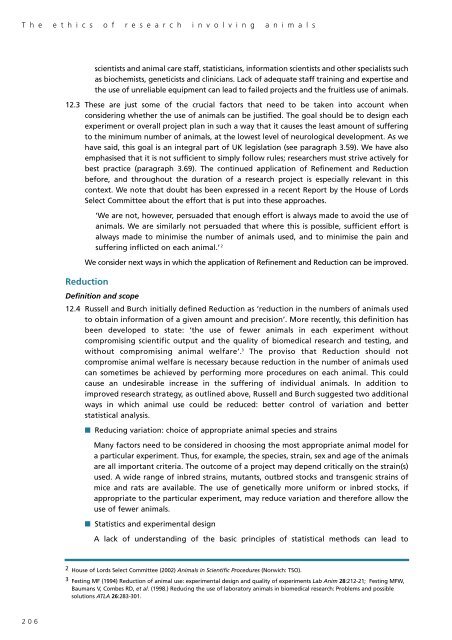The ethics of research involving animals - Nuffield Council on ...
The ethics of research involving animals - Nuffield Council on ...
The ethics of research involving animals - Nuffield Council on ...
You also want an ePaper? Increase the reach of your titles
YUMPU automatically turns print PDFs into web optimized ePapers that Google loves.
T h e e t h i c s o f r e s e a r c h i n v o l v i n g a n i m a l s<br />
scientists and animal care staff, statisticians, informati<strong>on</strong> scientists and other specialists such<br />
as biochemists, geneticists and clinicians. Lack <str<strong>on</strong>g>of</str<strong>on</strong>g> adequate staff training and expertise and<br />
the use <str<strong>on</strong>g>of</str<strong>on</strong>g> unreliable equipment can lead to failed projects and the fruitless use <str<strong>on</strong>g>of</str<strong>on</strong>g> <str<strong>on</strong>g>animals</str<strong>on</strong>g>.<br />
12.3 <str<strong>on</strong>g>The</str<strong>on</strong>g>se are just some <str<strong>on</strong>g>of</str<strong>on</strong>g> the crucial factors that need to be taken into account when<br />
c<strong>on</strong>sidering whether the use <str<strong>on</strong>g>of</str<strong>on</strong>g> <str<strong>on</strong>g>animals</str<strong>on</strong>g> can be justified. <str<strong>on</strong>g>The</str<strong>on</strong>g> goal should be to design each<br />
experiment or overall project plan in such a way that it causes the least amount <str<strong>on</strong>g>of</str<strong>on</strong>g> suffering<br />
to the minimum number <str<strong>on</strong>g>of</str<strong>on</strong>g> <str<strong>on</strong>g>animals</str<strong>on</strong>g>, at the lowest level <str<strong>on</strong>g>of</str<strong>on</strong>g> neurological development. As we<br />
have said, this goal is an integral part <str<strong>on</strong>g>of</str<strong>on</strong>g> UK legislati<strong>on</strong> (see paragraph 3.59). We have also<br />
emphasised that it is not sufficient to simply follow rules; <str<strong>on</strong>g>research</str<strong>on</strong>g>ers must strive actively for<br />
best practice (paragraph 3.69). <str<strong>on</strong>g>The</str<strong>on</strong>g> c<strong>on</strong>tinued applicati<strong>on</strong> <str<strong>on</strong>g>of</str<strong>on</strong>g> Refinement and Reducti<strong>on</strong><br />
before, and throughout the durati<strong>on</strong> <str<strong>on</strong>g>of</str<strong>on</strong>g> a <str<strong>on</strong>g>research</str<strong>on</strong>g> project is especially relevant in this<br />
c<strong>on</strong>text. We note that doubt has been expressed in a recent Report by the House <str<strong>on</strong>g>of</str<strong>on</strong>g> Lords<br />
Select Committee about the effort that is put into these approaches.<br />
‘We are not, however, persuaded that enough effort is always made to avoid the use <str<strong>on</strong>g>of</str<strong>on</strong>g><br />
<str<strong>on</strong>g>animals</str<strong>on</strong>g>. We are similarly not persuaded that where this is possible, sufficient effort is<br />
always made to minimise the number <str<strong>on</strong>g>of</str<strong>on</strong>g> <str<strong>on</strong>g>animals</str<strong>on</strong>g> used, and to minimise the pain and<br />
suffering inflicted <strong>on</strong> each animal.’ 2<br />
We c<strong>on</strong>sider next ways in which the applicati<strong>on</strong> <str<strong>on</strong>g>of</str<strong>on</strong>g> Refinement and Reducti<strong>on</strong> can be improved.<br />
Reducti<strong>on</strong><br />
Definiti<strong>on</strong> and scope<br />
12.4 Russell and Burch initially defined Reducti<strong>on</strong> as ‘reducti<strong>on</strong> in the numbers <str<strong>on</strong>g>of</str<strong>on</strong>g> <str<strong>on</strong>g>animals</str<strong>on</strong>g> used<br />
to obtain informati<strong>on</strong> <str<strong>on</strong>g>of</str<strong>on</strong>g> a given amount and precisi<strong>on</strong>’. More recently, this definiti<strong>on</strong> has<br />
been developed to state: ‘the use <str<strong>on</strong>g>of</str<strong>on</strong>g> fewer <str<strong>on</strong>g>animals</str<strong>on</strong>g> in each experiment without<br />
compromising scientific output and the quality <str<strong>on</strong>g>of</str<strong>on</strong>g> biomedical <str<strong>on</strong>g>research</str<strong>on</strong>g> and testing, and<br />
without compromising animal welfare’. 3 <str<strong>on</strong>g>The</str<strong>on</strong>g> proviso that Reducti<strong>on</strong> should not<br />
compromise animal welfare is necessary because reducti<strong>on</strong> in the number <str<strong>on</strong>g>of</str<strong>on</strong>g> <str<strong>on</strong>g>animals</str<strong>on</strong>g> used<br />
can sometimes be achieved by performing more procedures <strong>on</strong> each animal. This could<br />
cause an undesirable increase in the suffering <str<strong>on</strong>g>of</str<strong>on</strong>g> individual <str<strong>on</strong>g>animals</str<strong>on</strong>g>. In additi<strong>on</strong> to<br />
improved <str<strong>on</strong>g>research</str<strong>on</strong>g> strategy, as outlined above, Russell and Burch suggested two additi<strong>on</strong>al<br />
ways in which animal use could be reduced: better c<strong>on</strong>trol <str<strong>on</strong>g>of</str<strong>on</strong>g> variati<strong>on</strong> and better<br />
statistical analysis.<br />
■ Reducing variati<strong>on</strong>: choice <str<strong>on</strong>g>of</str<strong>on</strong>g> appropriate animal species and strains<br />
Many factors need to be c<strong>on</strong>sidered in choosing the most appropriate animal model for<br />
a particular experiment. Thus, for example, the species, strain, sex and age <str<strong>on</strong>g>of</str<strong>on</strong>g> the <str<strong>on</strong>g>animals</str<strong>on</strong>g><br />
are all important criteria. <str<strong>on</strong>g>The</str<strong>on</strong>g> outcome <str<strong>on</strong>g>of</str<strong>on</strong>g> a project may depend critically <strong>on</strong> the strain(s)<br />
used. A wide range <str<strong>on</strong>g>of</str<strong>on</strong>g> inbred strains, mutants, outbred stocks and transgenic strains <str<strong>on</strong>g>of</str<strong>on</strong>g><br />
mice and rats are available. <str<strong>on</strong>g>The</str<strong>on</strong>g> use <str<strong>on</strong>g>of</str<strong>on</strong>g> genetically more uniform or inbred stocks, if<br />
appropriate to the particular experiment, may reduce variati<strong>on</strong> and therefore allow the<br />
use <str<strong>on</strong>g>of</str<strong>on</strong>g> fewer <str<strong>on</strong>g>animals</str<strong>on</strong>g>.<br />
■ Statistics and experimental design<br />
A lack <str<strong>on</strong>g>of</str<strong>on</strong>g> understanding <str<strong>on</strong>g>of</str<strong>on</strong>g> the basic principles <str<strong>on</strong>g>of</str<strong>on</strong>g> statistical methods can lead to<br />
2 House <str<strong>on</strong>g>of</str<strong>on</strong>g> Lords Select Committee (2002) Animals in Scientific Procedures (Norwich: TSO).<br />
3 Festing MF (1994) Reducti<strong>on</strong> <str<strong>on</strong>g>of</str<strong>on</strong>g> animal use: experimental design and quality <str<strong>on</strong>g>of</str<strong>on</strong>g> experiments Lab Anim 28:212-21; Festing MFW,<br />
Baumans V, Combes RD, et al. (1998.) Reducing the use <str<strong>on</strong>g>of</str<strong>on</strong>g> laboratory <str<strong>on</strong>g>animals</str<strong>on</strong>g> in biomedical <str<strong>on</strong>g>research</str<strong>on</strong>g>: Problems and possible<br />
soluti<strong>on</strong>s ATLA 26:283-301.<br />
206
















